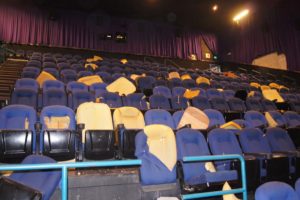 On May 19, 2016 a jury of 6 people ruled in favor of a movie theater in civil court, holding the theater could not have prevented a mass shooting that left 12 people dead. Several of the survivors and family members of those killed sued the movie theater and argued the theater had insufficient security and should have foreseen the possibility of a mass shooting at a big premiere movie event. We now wait for the promised appeal, but many are already chiming in on what the verdict means to movie theaters and other similarly situated hospitality companies around the country.
On May 19, 2016 a jury of 6 people ruled in favor of a movie theater in civil court, holding the theater could not have prevented a mass shooting that left 12 people dead. Several of the survivors and family members of those killed sued the movie theater and argued the theater had insufficient security and should have foreseen the possibility of a mass shooting at a big premiere movie event. We now wait for the promised appeal, but many are already chiming in on what the verdict means to movie theaters and other similarly situated hospitality companies around the country.
Since the verdict, multiple articles have cited security consultants and stated that a verdict against the theater would have likely resulted in the use of metal detectors, increased security and significantly higher ticket prices but now “theater owners are probably breathing a sigh of relief.” (See, http://abcnews.go.com/US/wireStory/jurors-deliberating-colorado-theater-civil-trial-39220300)
While I completely agree with the theater’s defense that nothing could have stopped this shooting, I would not agree that theater owners are breathing a sigh of relief – or at least they certainly shouldn’t be. This 2012 mass movie theater shooting was really the first of its kind, but unfortunately it was not the last. That means the Plaintiff’s Bar will now argue that any future mass theater shooting is “foreseeable.”
A focus of the defense in this case was that the shooting was completely random and not foreseeable. Foreseeability is a necessary element to prove negligence in any criminal act of third party case across the country. The problem is that it is much easier for the defense to argue there was no foreseeability with the first mass shooting. From now on, that argument will not hold as much weight.
From the plaintiff’s extremely broad perspective, all movie theaters can now “foresee” that a mass shooting could take place. From the defense perspective, any crime is arguably foreseeable. The key is what is reasonably foreseeable and what are the reasonable actions a movie theater must take to prevent a shooting from taking place. Arguing that mass shootings are now foreseeable to all retail and hospitality companies is a position that plaintiffs should really think twice about making because while it may get them a few bucks, its impact on society is significant.
One of the most common arguments used in criminal acts of third party cases involving a shooting is that the security guards should have been armed. This argument has been made by the Plaintiffs’ Bar for decades and it was made in the Colorado case. While the argument sounds good (which is why they keep making it), in reality the use of an armed guard would almost always be insufficient to prevent the shooting event and in some cases, could actually worsen the event.
Why? Look at this case as an example. According to news reports, the shooter wore a ballistic helmet, protective gear for his legs, throat and groin, black gloves and a gas mask. He propped open a back door and threw two tear gas canisters into the theater. Once the canisters exploded, he started shooting. Police say he used an AR-15 rifle, a 12-gauge shotgun and at least one of two .40-caliber handguns recovered at the scene. Soon after the shooting started, the fire alarm was sounded. From the reports it seems the shootings lasted for less than a few minutes and within 6 minutes of the first 911 call, the shooter surrendered to police near his car in the parking lot – after the shooter was initially misidentified as a police officer due to his protective gear. (See, www wikipedia.org/wiki/2012_Aurora_shooting).
In this type of situation, an armed security guard would most likely not have time to get to the theater to stop the shootings, especially when a fire alarm prevents the guard from hearing the shots and from knowing the location of the shootings. The guard would also be significantly lacking in fire power and ability to stop someone like this shooter. An armed guard is simply no match for a psychopathic mass shooter.
So what does this mean for movie theaters? Unfortunately for movie theater owners and movie goers alike, it likely means increased security and increased ticket prices – at least for big premiers. Another likely outcome is that most, if not all, movie theaters will post no-gun signs because failure to do so would be pure ammunition for the Plaintiff’s Bar.
If you want to read more about the verdict and what people think of its impact, here are a few links:
http://abcnews.go.com/US/wireStory/jurors-deliberating-colorado-theater-civil-trial-39220300
http://www.reuters.com/article/us-colorado-shooting-lawsuit-idUSKCN0YA06P
PHOTO: Inside the Colorado movie theater following the 2012 mass shooting. Photo was released by the Colorado District Attorney’s Office following the conclusion of the criminal trial. (http://www.nydailynews.com/news/shocking-photos-aurora-movie-theater-crime-scene-shooter-home-gallery-1.2355348)